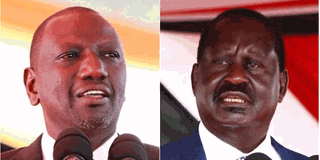William Ruto, Raila Odinga promise free education as they woo voters

President William Ruto (left) and ODM leader Raila Odinga.
Access to free education for all learners in the country has taken centre stage in the presidential campaigns ahead of the August 9 General Election.
Presidential candidates from the two main political formations – Azimio la Umoja’s Raila Odinga and Kenya Kwanza’s William Ruto – have both made promises to improve access to education for all learners once they clinch power.
In his campaigns, Mr Odinga has pledged to introduce free education to all learners in the country, from pre-primary to tertiary level. He has also promised to ensure access to education for learners with special needs.
“I will ensure that education is free from pre-primary, primary, secondary, tertiary to university,” said Mr Odinga while speaking in Vihiga County. The promise is part of the 10-point agenda he has outlined as his campaign strategy.
Dr Ruto has promised to amend the Higher Education Loans Board (Helb) Act and turn student loans into grants. The DP said the amendments would also see interest charged on student loans scrapped, loan allocation increased and issuance speeded up.
Government’s success
Dr Ruto is also banking on the current government’s success in education programmes to improve the sector if elected the next president, saying he has been part and parcel of the programmes under the Jubilee government.
Mr Odinga is yet to reveal to what extent, if elected, his government will fund education programmes, or whether his government will pay boarding fees for students. Parents have been complaining about high boarding fees and extra levies charged by some schools.
Currently, the government runs the free primary education (FPE) and free day secondary education (FDSE) programmes in public schools. Whereas the money covers tuition fees, school managers say that it is not adequate to run the institutions and resort to asking parents to bridge the gap.
FPE was introduced in 2003 by President Mwai Kibaki. Under the programme, each learner has an annual capitation of Sh1,420 paid by the government.
In 2013, President Uhuru Kenyatta introduced FDSE as part of the promises he made during the campaigns. Under the programme, the government allocates Sh22,244 annually for every secondary school student’s tuition fee. Those in special needs boarding schools receive an enhanced capitation of Sh57,700 per learner.
Revise the capitation
Despite primary and secondary school headteachers appealing to the government to revise the capitation, their efforts have not borne fruit. The Kenya Primary School Heads Association, for example, last year petitioned the Ministry of Education to increase the capitation to Sh8,077 annually, to no avail.
Similarly, the Kenya Secondary Schools Heads Association has repeatedly pushed for an increase in capitation but its demands have fallen on deaf ears. Last month, during their annual conference in Mombasa, the principals proposed an increment of Sh16,000 to enable them to run the institutions and offset pending bills.
The heads wanted Sh8,000 to be part of the capitation increment and Sh8,000 to be paid as additional fees by parents. However, their demands were strongly opposed by parents and other education stakeholders, while the Ministry of Education has not yet responded to the proposal.
Pre-primary education is under the county governments, which have developed individual fees guidelines. Some have subsidised the fees while others provide school feeding programmes.
At the Technical and Vocational Education and Training level, all students under government sponsorship get Sh26,000 each, and are also eligible for a Sh30,000 loan from Helb.
In universities, the government pays Sh70,000 as tuition fee per student as part of the government sponsorship programme. Government fee regulations require university students to pay only Sh16,000 a year, a figure that has stood for more than 30 years.
Financial stability
A push by the Vice-Chancellors Committee to amend the Universities Act to triple the fees to Sh48,000 has so far been unsuccessful. Only the University of Nairobi has raised its fees for students joining the institution, in an effort to achieve financial stability.
Helb gives a minimum of Sh37,000 and a maximum of Sh60,000 as loans to university students annually. Currently, Helb is unable to fund all students due to underfunding.
Many public universities are also in financial crises due to underfunding from the government and the near-collapse of the self-sponsored programmes, which were a cash cow.
The government currently funds education at 25 per cent of the total national budget, which is among the highest in the world.
In the 2022/2023 budget, the education sector was allocated Sh544.4 billion. FPE was allocated Sh1.2 billion while FDSE received Sh64.4 billion.
Settle pending bills
National Treasury and Planning Cabinet Secretary Ukur Yatani allocated Sh91.2 billion to public universities, instead of the Sh102.807 billion they needed to settle pending bills, unpaid salaries and to sustain themselves in the next financial year.
Mr Yatani also allocated Sh5.2 billion for Tvet students and a further Sh527 million for Tvet and entrepreneurship development.





